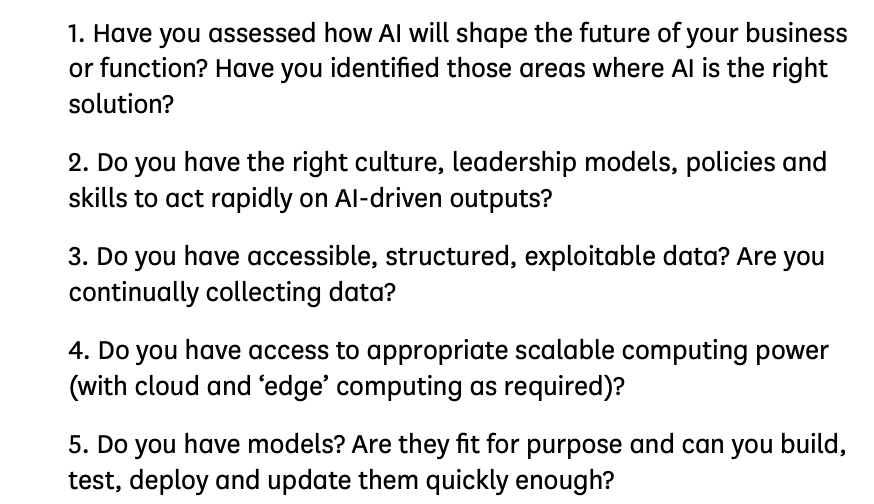UK AI defence "gap" exposed as Keir Starmer vows to make Britain a world leader
Stifling bureaucracy, uncompetitive wages and a dreary lack of innovation hampering defensive and offensive artificial intelligence research.

The UK's AI defence sector is "underdeveloped" - putting the UK at a significant disadvantage against rivals like China and Russia in a worsening geopolitical threat landscape.
That's the warning in a new research paper released quietly last week, which throws doubt over the likely success of Sir Keir Starmer's plan to ensure AI is "mainlined into the UK's veins" - a strategy intended to make the UK a world leader.
Late on Sunday night, Labour promised to spend billions on increasing public sector compute twenty-fold by 2030 and using AI for everything from finding potholes to assisting teachers in the classroom.
But despite the pleasure of a short-term buzz, injecting stimulants rarely ends well in the long term.
The latest report to the House of Commons Defence Committee makes for stark and alarming reading.
"In many key indicators [the UK] lags far behind the global leaders in AI, the United States and China," the briefing warned.
"Both countries’ total government spending on Artificial Intelligence is more than four times that of the UK Government, and the number and processing power of supercomputers in the US and China far outstrips the UK."
Things can only get battered: Britain's AI defence challenge

The report identifies a "say-do gap" between "reality and rhetoric", putting the UK at risk as the risk of global conflict intensifies.
Emma Lewell-Buck MP, Chair of the Sub-Committee on Developing AI capacity and expertise in UK Defence, said: "The UK must move fast to avoid falling behind. The use of AI in Ukraine shows that it offers serious military advantage on the battlefield, and as AI becomes more widespread and sophisticated, it will change the way defence works, from the back office to the frontline.
“Our inquiry discovered a gap between the Ministry of Defence’s rhetoric and reality on AI. While the department acknowledges the importance of AI, these words have not been borne out by action. With the global threat picture ever-worsening, and the pace of technological change moving at a rapid speed, the Ministry of Defence has no time to lose."
The perils and pleasures of mainlining AI

Today, Prime Minister Starmer will deliver a speech setting out his ambition to make the UK a world leader in AI in a bid to increase productivity by 1.5% per year and bring in £47 billion ($57 billion) annually.
Starmer will say: "Artificial Intelligence will drive incredible change in our country. From teachers personalising lessons, to supporting small businesses with their record-keeping, to speeding up planning applications, it has the potential to transform the lives of working people.
"But the AI industry needs a government that is on their side, one that won’t sit back and let opportunities slip through its fingers. And in a world of fierce competition, we cannot stand by. We must move fast and take action to win the global race.
"Our plan will make Britain the world leader. It will give the industry the foundation it needs and will turbocharge the Plan for Change. That means more jobs and investment in the UK, more money in people’s pockets, and transformed public services.
"That’s the change this government is delivering."
Britain's AI defence "gap"

Here are some of the reasons the UK's defence AI industry is lagging behind.
1) The "say-do" gap between policy rhetoric and practical reality
Despite the UK having strong universities, a vibrant tech sector, and good AI research scene, its defence-focused AI sector remains relatively small. There is a significant gap between the UK and the global AI leaders (notably the US and China). This under-development discourages investment and slows the growth of AI capacity.
The Ministry of Defence (MOD) frequently labels AI as “paradigm-shifting” but, in practice, often treats it as a peripheral interest rather than a core defence capability. This undermines investor confidence, puts off smaller innovators, and leaves many AI initiatives stuck in early or experimental phases without scaling up.
2) Risk aversion
AI operates on short development cycles and thrives under rapid experimentation. However, traditional defence procurement involves long timelines, risk aversion, and detailed specifications. Many smaller AI companies find the MOD too slow to engage with and cannot survive a drawn-out acquisition process or navigate complex, large-scale contracts.
The report said: "James Black of RAND Europe pointed out that there are good reasons - including safety and political concerns - for Defence to be comparatively risk-averse, but at the same time a reluctance to try new things could result in the UK’s military advantage slowly diminishing over time.
"He contrasted this with Ukraine’s situation where the existential danger of Russia’s invasion has changed the risk calculation and heavily incentivised experimentation, with the result that more innovative ideas were being tried.
"Dr Simona Soare said that the present attitude in UK Defence was one which sought to avoid ‘regret’, i.e. procurements where things go wrong; she said that Defence ought to recognise that time wasted through excessive caution also resulted in lost military capability."
3) Bureaucracy and inefficiency
Effective AI needs large, high-quality datasets plus secure cloud computing and robust digital networks. The MOD’s plan to build cloud with a "secret" security classification is now almost three years behind schedule. Bottlenecks in data availability and classification hamper AI development, particularly when working with non-traditional suppliers and start-ups.
Defence innovation often remains stuck in prototype mode. Despite small-scale experiments and trials (e.g., through DASA grants), there is no dependable system to scale up successful AI prototypes for active service. This “valley of death” between initial innovation and full adoption limits real-world impact.
Responsibility for AI is spread across multiple MOD bodies, making it difficult to implement a joined-up approach. The Defence AI Centre (DAIC) exists but has limited authority to mandate uniform AI practices or drive large-scale adoption. There is an ongoing call for much higher-level oversight of AI deployment.
4) Skills shortages caused by bad pay and limited career pathways
Both MOD and the broader UK defence sector struggle to attract and retain top AI talent. Defence pay is often uncompetitive, the security clearance can be slow, and the work is, by nature, less flexible. Meanwhile, the need for AI specialists grows rapidly. MOD also needs greater general AI literacy among leaders, not just technical experts.
"The reward, flexibility and freedoms afforded to AI researchers in academia and (non-defence) industry research is often in sharp contrast to that on offer from the defence sector itself," said Professor Toby Breckon, Professor of Computer Vision at Durham University. "My postgraduate qualified students often land well-paid industry jobs, based in city-centre business hubs with flexible working and the freedom to continue to publish their work, often focussed on fundamental AI research topics, in the open scientific literature."
Have you got a story to share? Get in touch and let us know.




